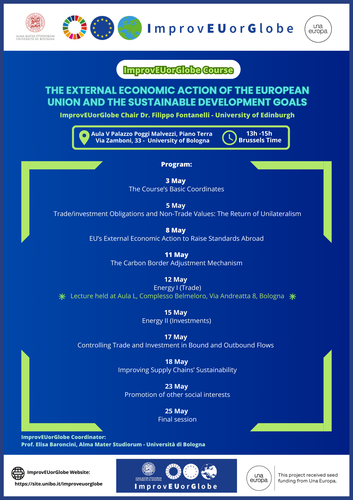
These sessions will take place on Teams. Dates, times and links are as follows:
Monday July 10th, 14:00-16:00 CEST Teams link
Monday July 17th, 14:00-16:00 CEST Teams link
Monday July 31st, 09:00-11:00 CEST Teams link
Many States no longer consider the liberalisation of global trade and investment flows an inherent good. Economic growth can both promote and hinder sustainable development; in the past decade, many unilateral or cooperative initiatives have emerged which seek to administer trade and investment to curb their detrimental effects. The European Union is at the forefront of many of these policies, and its external economic action is at an inflection point and is worth studying and assessing. In particular, it appears that while the EU continues to pledge loyalty to the rules and process of the World Trade Organization and strives to promote public goods in the multilateral fora, it has also equipped itself with many new regulatory tools, which ‘project’ its values beyond its boundaries.
It is impossible to read the EU’s current resort to unilateralism univocally, which are shaped by, and respond to, mixed motives and circumstances. The EU, understandably, is repositioning itself in an ecosystem in which multilateral trade rules are losing their bite, and major actors are opening using unilateral measures to advance their global agendas. At the same time, environmental protection has overtaken economic liberalisation in the ranking of the most urgent values, and the EU is re-shaping its external action accordingly, at the price of creating new barriers at the border, or adopting regulation with extra-territorial effects.
The primary aim of this course is to take stock of this new landscape, and observe in particular all the plans made by the EU to attain the sustainable development goals through its external actions in trade and investment matters. This ‘charting’ exercise will also allow us to assess and gauge the design and effects of these instruments (severally and collectively), and estimate their genuine connection with their putative goals. At the end of the course, we will be able to have an informed and insightful view of the EU’s contemporary track record in the field of external economic action, and judge its correspondence to the EU’s SDG agenda.
All participants are welcome. Prior knowledge of basic matters of EU law, WTO law and investment law is helpful.
Full Program in pdf
The Course’s Basic Coordinates; Trade law, Investment Law and Sustainable Development: basic notions; the EU competences and policies in Trade and Investment Law.
Trade/Investment Obligations and Non-Trade Values: the Return of Unilateralism o The backlash against investor-State arbitration. o The backlash against trade liberalisation o Reform proposals for the global investment and trade regimes o An overview of re-nationalisation trends in trade an investment (US, EU, UK, China).
EU’s External Economic Action to Raise Standards Abroad: - Free trade agreements and non-economic standards - 2022 commitment to green trade partnership - Deforestation and FTA with MERCOSUR - Zoom-in: EU dispute with Korea on labour rights - Zoom-in: level playing field and sustainable development in the Trade and Cooperation Agreement between the EU and the UK - Mirror clauses in FTAs
The Carbon Border Adjustment Mechanism: - Overview and assessment of the scheme - Compatibility with WTO law (China’s complaint at WTO) - Bonus topic: carbon removal.
Energy I (Trade) - EU Net Zero Industry Act and support to renewable energy industry (with assessment of WTO compatibility) - Reaction to comparable foreign plans (US IRA) - Zoom-in: biofuels and e-fuels - ILUC standards for trade in biofuels.
Energy II (Investments) - Foreign Investment Protection and the Fossil Fuels Industry - Foreign Investment Protection and the Nuclear Energy Industry - Foreign Investment Protection and the Renewable Energy Industry - The Energy Charter Treaty: Its Reform Attempts and the Withdrawal of EU Member States.
Controlling trade and investment inbound and outbound flows: Export restrictions and export controls (including coordinated action with US) - Critical Raw Materials Act - EU investment screening
Improving Supply Chains’ Sustainability: Friend-shoring and sustainable value chains - Global supply chain due diligence proposal - EU Guidance to Combat Forced Labor in Supply Chains - Responsible forestry proposal (trade in forest-risk commodities) - WTO law-compatibility of these schemes.
Promotion of other social interests: Trade union freedoms and other labour standards in FTAs -Gender balance in corporate governance in FTAs - Protection of indigenous peoples’ rights.
Revision
The Relevance of EU Trade and Investment Policy in the Current Geopolitical Scenario